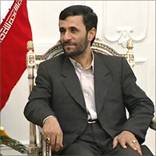

| Home | Our Leadership | Our Economies | Our Wars | Our Perspectives | Our Culture | Links | About |
Blogging is becoming increasingly popular among political leaders of creating their public image. Presidents and prime-ministers, senators and deputies all over the world are using Internet technologies to introduce themselves to the public at-large.

For example, U.S. president-elect Barack Obama has managed to use his blogs on myspace.com as an effective addition to more traditional modes of campaigning. Though the clips placed there look like Hollywood movies, they have attracted a huge amount of interest. On the eve of the elections, approximately 150,000 visitors of Obama’s blog have responded with favorable and supportive comments.
 The video blog of Russian president Dmitry Medvedev is much more official, despite the fact that he directly addresses the audience. Although Medvedev assures that “he is going to develop an interactive dialogue with visitors of his blog,” visitors are not allowed to leave comments yet. So, for today the only possible way of communication with the Russian president for Internet users is sending him an e-mail. Maybe he will answer…
The video blog of Russian president Dmitry Medvedev is much more official, despite the fact that he directly addresses the audience. Although Medvedev assures that “he is going to develop an interactive dialogue with visitors of his blog,” visitors are not allowed to leave comments yet. So, for today the only possible way of communication with the Russian president for Internet users is sending him an e-mail. Maybe he will answer…

David Miliband, Great Britain’s Secretary of Foreign and Commonwealth Affairs, primarily focusses on his poltical agenda in his blog Trying to be open and interesting, he also posts his private opinions and impressions as well. Miliband seems to actually write the blog himself and does so in a conversational tone. Visitors of his blog are able to comment on the posts and to ask the Secretary questions. However, Miliband doesn’t answer these questions in his blog, only by e-mail.
 The Iranian president, Mahmoud Ahmadinejad, surely writes his blog himself. He usually touches upon not only political issues but religious questions as well, particularly subjects concerning relationships between Islamic and non-Islamic cultures. Thanks to Ahmadinejad’s openness to the Internet-society, visitors of his blog from all over the world can see an image of Iranian reality which is different from the image created by their local media. The Iranian president is asked lots of questions by the audience of his blog, and unlike his colleagues from the USA and Russia, Ahmadinejad tries to respond to all the questions in his blog.
The Iranian president, Mahmoud Ahmadinejad, surely writes his blog himself. He usually touches upon not only political issues but religious questions as well, particularly subjects concerning relationships between Islamic and non-Islamic cultures. Thanks to Ahmadinejad’s openness to the Internet-society, visitors of his blog from all over the world can see an image of Iranian reality which is different from the image created by their local media. The Iranian president is asked lots of questions by the audience of his blog, and unlike his colleagues from the USA and Russia, Ahmadinejad tries to respond to all the questions in his blog.
At quick glance, it seems as though few polticians who have blogs are actually interested in being open and transparent on the Internet. Most of them just want to look open and modern by blogging. Today politicians’ blogs, at least for the present time, are predominately serving the function of a newer and more effective means of public relations, rather than sincere attempts to communication with their electorate.